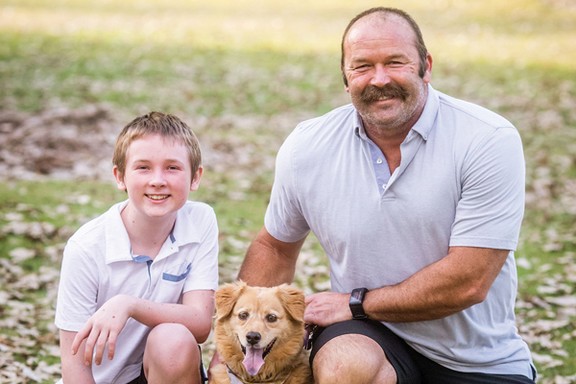Jun 01, 2021
As the spring season comes to a close, the days are growing longer, and the weather is getting hotter. When the calendar turns the page to June, it signifies the end of the school year, the start of vacation season and coincidentally, what is typically a very busy part of fire season in California. It’s important to note that June is also Post Traumatic Stress Disorder awareness month, a disorder that is usually associated with war-related trauma for veterans, but is also a very common side effect for first responders who deal with trauma on what can be a day-to-day basis. Left unchecked and untreated, the effects of PTSD can lead to anxiety, depression, and for some, suicide.
The struggles of Post Traumatic Stress Disorder hit close to home for one of Kern County’s own—Fire Captain, Derek Robinson. After a few years of silence, Derek decided to open up and share his story of how he overcame the darkness of PTSD and detail his steps to recovery, in hopes that he may help someone else on their own journey. I recently had the chance to ask him a few questions about his new book, Continue: Surviving the darkness, choosing to live.
KCFM: Why did you decide to write a book?
Robinson: Honestly, I don’t remember specifically deciding to write a book. I wrote a post one night that I ended up sharing on my Facebook page. I was nervous to share something so intimate and personal to such a wide audience, but I felt it needed to be done, in case it could help someone else going through the same thing. The book was something many suggested after the post was so well-received. I decided to start journaling my thoughts until one day I realized I might actually have enough to put in a book format. The Facebook post became the first chapter of the book.
KCFM: You've said your main goal was to help just one person choose life over suicide, have you seen that come to light since your book has been published?
Robinson: I can’t say that I have seen this come to fruition directly, but indirectly it has definitely helped some I know personally, get on a better path in dealing with their Post Traumatic Stress.
KCFM: Post-traumatic stress disorder (PTSD) was first classified as a specific condition by the APA in 1980. In your book you talk about a newer name for it, post-traumatic stress injury (PTSI). Can you explain the differences and how they specifically manifest and relate to firefighters?
Robinson: I think changing it to Injury from Disorder is a concerted effort to break a stigma associated with Behavioral Health. “Disorder” sounds like a condition you carry for life, and there may not be a recovery from it. Saying, “injury,” is closer to the truth as PTS is very treatable. Proper treatment is key, but we are all unique individuals from the way we grieve, to the way we laugh. The key is to find the method that works for the individual and. to find the right counselor.
KCFM: In your opinion, do you think the numbers of first responders struggling with job-related PTSD/PTSI have increased or are we just more aware of it and it is becoming less of a stigma to tell someone when help is needed?
Robinson: Both; this job continues to be more violent and the numbers of calls keep going up. We are definitely becoming more aware of the stressful impacts the job put on us, but sadly, the stigma is still very strong. It is literally killing people because they are afraid to ask for help.
KCFM: When you feel your anxiety or symptoms of PTSI creeping back in again, what are some things you do for yourself as a type of self-care?
Robinson: Swimming has always been my go-to outlet for reducing stress. As detailed in the book, I almost lost that love. I was also introduced to Cross-Fit during my dark days. I still do both, but have added meditation and practice being mindful. Now a bad day is just a bad day; it’s just a low, and it will pass. Before I got help, I lived every day in that low.
KCFM: What advice do you have for families of first responders or a loved one of a first responder? What are the most common symptoms?
Robinson: Some early indicators could be as simple as an increased use in alcohol or sleep aids. An increase in irritability may also present itself. Others can be more subtle, like avoiding social gatherings or a loss of interest in a long held hobby. There are many more and it manifests itself individually as the stressors impact us each individually. The best thing a family member or loved one can do is get educated on signs and to be hyper aware. There are also two pages of symptoms and more resources listed in the book.
KCFM: How has your book been received among your own family members and friends?
Robinson: My family and friends have been wildly supportive. It has helped create stronger bonds and has promoted more open communication. None of them, friends and family alike, had any idea I was struggling until the Facebook post. I think the point, and the scariest part of all this, is that you can be intimately engaged in someone’s everyday life and still have no clue.
I gave my 14-year-old son a signed copy of the book and he sat down and read it in one day. He knows all about the book and my struggles. He sat next to me many times as I shared my story with friends and family and even helped prompt me when I would forget something!
KCFM: Now that your book is published, what's next? Will there be a second book?
Robinson: Going forward I will continue to advocate for Behavioral Health Awareness and work to reduce a stigma that is killing first responders. I started public pages on social media to promote awareness and encourage healing, and many have reached out. I have not committed to a second book, but I wouldn’t rule it out. I just put so much into this one; I am not sure what I have left to write.
Continue; surviving the darkness, choosing to live, is available on Amazon.com, both in print and digital editions.
Local resources for emergency responders and their families
Public Safety Professionals Retreat (ProSPeR) provides a confidential and secure facility for stress- and trauma related healing and education for those professionally committed to, or retired from, law enforcement, firefighting, and other public safety and emergency response roles in their communities. www.prosperetreat.com
Firefighter & Family Crisis (844)-525-FIRE (3473), crisistextline.org or text 741741, www.copline.org or (800)-267-5463,
suicidepreventinlifeline.org or (800)-273-8255, and safecallnowusa.org or (206)-459-3020.
National Suicide Prevention Lifeline 1.800.273.8255
The struggles of Post Traumatic Stress Disorder hit close to home for one of Kern County’s own—Fire Captain, Derek Robinson. After a few years of silence, Derek decided to open up and share his story of how he overcame the darkness of PTSD and detail his steps to recovery, in hopes that he may help someone else on their own journey. I recently had the chance to ask him a few questions about his new book, Continue: Surviving the darkness, choosing to live.
KCFM: Why did you decide to write a book?
Robinson: Honestly, I don’t remember specifically deciding to write a book. I wrote a post one night that I ended up sharing on my Facebook page. I was nervous to share something so intimate and personal to such a wide audience, but I felt it needed to be done, in case it could help someone else going through the same thing. The book was something many suggested after the post was so well-received. I decided to start journaling my thoughts until one day I realized I might actually have enough to put in a book format. The Facebook post became the first chapter of the book.
KCFM: You've said your main goal was to help just one person choose life over suicide, have you seen that come to light since your book has been published?
Robinson: I can’t say that I have seen this come to fruition directly, but indirectly it has definitely helped some I know personally, get on a better path in dealing with their Post Traumatic Stress.
KCFM: Post-traumatic stress disorder (PTSD) was first classified as a specific condition by the APA in 1980. In your book you talk about a newer name for it, post-traumatic stress injury (PTSI). Can you explain the differences and how they specifically manifest and relate to firefighters?
Robinson: I think changing it to Injury from Disorder is a concerted effort to break a stigma associated with Behavioral Health. “Disorder” sounds like a condition you carry for life, and there may not be a recovery from it. Saying, “injury,” is closer to the truth as PTS is very treatable. Proper treatment is key, but we are all unique individuals from the way we grieve, to the way we laugh. The key is to find the method that works for the individual and. to find the right counselor.
KCFM: In your opinion, do you think the numbers of first responders struggling with job-related PTSD/PTSI have increased or are we just more aware of it and it is becoming less of a stigma to tell someone when help is needed?
Robinson: Both; this job continues to be more violent and the numbers of calls keep going up. We are definitely becoming more aware of the stressful impacts the job put on us, but sadly, the stigma is still very strong. It is literally killing people because they are afraid to ask for help.
KCFM: When you feel your anxiety or symptoms of PTSI creeping back in again, what are some things you do for yourself as a type of self-care?
Robinson: Swimming has always been my go-to outlet for reducing stress. As detailed in the book, I almost lost that love. I was also introduced to Cross-Fit during my dark days. I still do both, but have added meditation and practice being mindful. Now a bad day is just a bad day; it’s just a low, and it will pass. Before I got help, I lived every day in that low.
KCFM: What advice do you have for families of first responders or a loved one of a first responder? What are the most common symptoms?
Robinson: Some early indicators could be as simple as an increased use in alcohol or sleep aids. An increase in irritability may also present itself. Others can be more subtle, like avoiding social gatherings or a loss of interest in a long held hobby. There are many more and it manifests itself individually as the stressors impact us each individually. The best thing a family member or loved one can do is get educated on signs and to be hyper aware. There are also two pages of symptoms and more resources listed in the book.
KCFM: How has your book been received among your own family members and friends?
Robinson: My family and friends have been wildly supportive. It has helped create stronger bonds and has promoted more open communication. None of them, friends and family alike, had any idea I was struggling until the Facebook post. I think the point, and the scariest part of all this, is that you can be intimately engaged in someone’s everyday life and still have no clue.
I gave my 14-year-old son a signed copy of the book and he sat down and read it in one day. He knows all about the book and my struggles. He sat next to me many times as I shared my story with friends and family and even helped prompt me when I would forget something!
KCFM: Now that your book is published, what's next? Will there be a second book?
Robinson: Going forward I will continue to advocate for Behavioral Health Awareness and work to reduce a stigma that is killing first responders. I started public pages on social media to promote awareness and encourage healing, and many have reached out. I have not committed to a second book, but I wouldn’t rule it out. I just put so much into this one; I am not sure what I have left to write.
Continue; surviving the darkness, choosing to live, is available on Amazon.com, both in print and digital editions.
Local resources for emergency responders and their families
Public Safety Professionals Retreat (ProSPeR) provides a confidential and secure facility for stress- and trauma related healing and education for those professionally committed to, or retired from, law enforcement, firefighting, and other public safety and emergency response roles in their communities. www.prosperetreat.com
Firefighter & Family Crisis (844)-525-FIRE (3473), crisistextline.org or text 741741, www.copline.org or (800)-267-5463,
suicidepreventinlifeline.org or (800)-273-8255, and safecallnowusa.org or (206)-459-3020.
National Suicide Prevention Lifeline 1.800.273.8255








